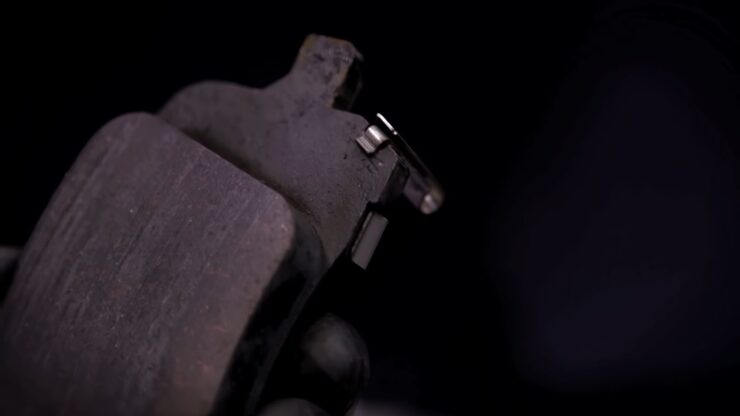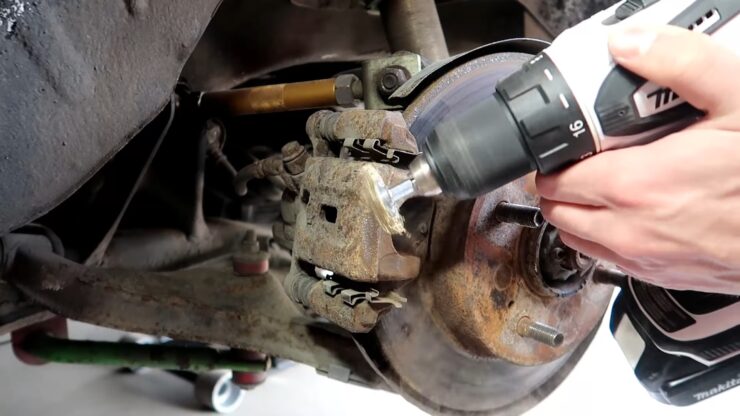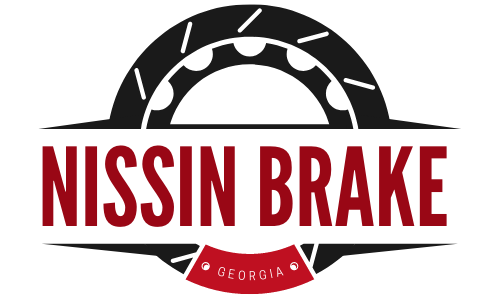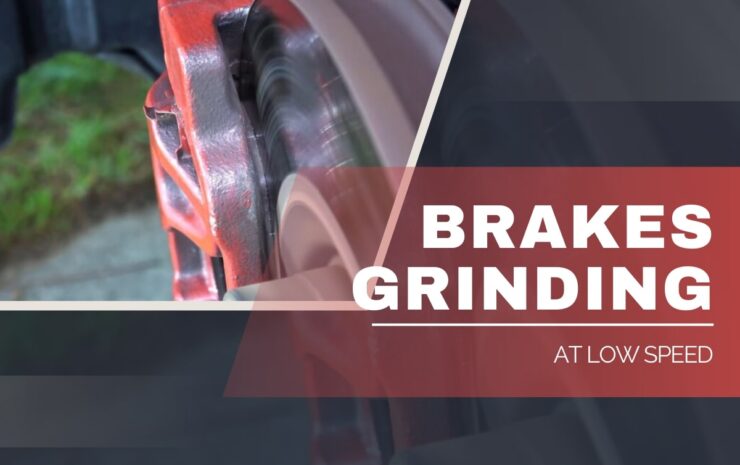Your brakes are crucial to the overall safety of your vehicle. Brakes grinding at low speed can be a frustrating and worrying issue, as this grinding can damage your brake system and reduce its effectiveness. In this comprehensive article, we’ll explore thirteen common reasons for this grinding noise and provide you with the solutions you need to keep your brakes in top shape. With the right information and care, you can protect yourself, your passengers, and your investment in your vehicle.
1. Worn Brake Pads

Reason
Worn brake pads are one of the most common causes of grinding brakes at low speeds. Over time, the friction material on the brake pads wears down, leaving the metal backing plate in direct contact with the brake rotor. This metal-on-metal contact creates the grinding noise you hear.
Solution
Inspect your brake pads for wear and tear. If they’re worn down, replace them as soon as possible. You can purchase new brake pads at any auto parts store, and many professional mechanics can install them for you. It’s essential to choose high-quality brake pads to ensure the longevity of your brake system and prevent further issues.
2. Damaged Brake Rotors
Reason
Another reason for brakes grinding at low speeds is damage to the brake rotors. The rotors can become warped, cracked, or have an uneven surface, causing the brake pads to contact the rotors unevenly, resulting in a grinding noise.
Solution
Inspect your brake rotors for signs of damage. If you find any issues, replace the damaged rotors with new ones. In some cases, you might be able to have your rotors resurfaced, which involves grinding down the rotor surface to create a smooth, even surface for the brake pads to grip.
3. Debris Caught in the Brake System
Reason
Small rocks, sand, and other debris can get caught between the brake pad and rotor, causing a grinding noise when you apply the brakes at low speed. This debris can damage your brake pads and rotors, reducing the effectiveness of your braking system.
Solution
Inspect your brake system for any visible debris and remove it carefully. You can use a compressed air canister or a soft brush to clean the area. It’s essential to keep your brakes clean and free of debris to prevent grinding noises and damage to your brake system.
4. Improperly Installed Brake Pads
Reason
If your brake pads are not correctly installed, they may not be making even contact with the brake rotors, causing a grinding noise at low speed. This issue could result from a DIY brake pad installation or a professional mechanic’s mistake.
Solution
Inspect your brake pads to ensure they are correctly installed. If you’re unsure, take your vehicle to a professional mechanic for a thorough inspection and any necessary adjustments or corrections.
5. Corroded Brake Calipers

Reason
Brake calipers can become corroded or rusted over time, causing them to stick or seize. When this happens, the brake pads may not fully retract from the rotor, resulting in a grinding noise at low speed.
Solution
Inspect your brake calipers for signs of corrosion or rust. If you find any issues, you may need to replace the calipers or have them professionally cleaned and lubricated. Regularly cleaning and maintaining your brake system can help prevent this problem in the future.
6. Worn Wheel Bearings
Reason
Worn wheel bearings can also cause grinding noises at low speeds. As the bearings wear down, they can cause the wheel to wobble, affecting the alignment of the brake pads and rotor.
Solution
Inspect your wheel bearings for signs of wear and replace them if necessary. If you’re unsure whether your wheel bearings are causing the grinding noise, consult a professional mechanic. They can diagnose the issue and recommend the appropriate repairs.
7. Damaged Brake Shims
Reason
Brake shims are thin layers of metal or rubber placed between the brake pads and calipers to reduce noise and vibration. Over time, these shims can become damaged or worn, leading to uneven contact between the brake pads and rotors, causing grinding noises at low speeds.
Solution
Inspect your brake shims for signs of wear or damage. If you find any issues, replace the damaged shims with new ones. It’s essential to use high-quality brake shims to ensure the longevity and effectiveness of your brake system.
8. Incorrectly Machined Rotors
Reason
Poorly machined or improperly balanced brake rotors can cause uneven wear on the brake pads and create grinding noises at low speeds. This issue can be a manufacturing defect or result from subpar workmanship during rotor resurfacing.
Solution
If you suspect your rotors are incorrectly machined or imbalanced, consult a professional mechanic. They can assess the situation and recommend the appropriate course of action, which may include replacing the rotors or having them professionally resurfaced.
9. Brake Pad Glazing
Reason
Brake pad glazing occurs when the brake pads get excessively heated, causing the friction material to harden and become smooth. This glazing reduces the pad’s gripping ability and can cause a grinding noise at low speeds.
Solution
Inspect your brake pads for signs of glazing. If you notice a shiny or smooth surface on the pads, replace them with new ones. To prevent glazing, avoid aggressive or sudden braking and ensure your brake system is regularly maintained.
10. Brake Pad Material
Reason
The material used in your brake pads can also contribute to grinding noises at low speeds. Some brake pads are made of harder materials that can be more prone to noise, especially when they’re cold or not yet broken in.
Solution
If you’ve recently replaced your brake pads and the grinding noise persists, consider trying a different type of brake pad. Consult a professional mechanic or an auto parts store for recommendations on the best brake pad material for your specific vehicle and driving conditions.
11. Loose Brake Components
Reason
Loose or improperly secured brake components can cause grinding noises at low speeds, as they may move or vibrate when the brakes are applied. This issue can result from improper installation or general wear and tear.
Solution
Inspect your brake system for any loose components, such as caliper bolts or brake pad retaining clips. Tighten any loose parts or replace them if they’re damaged. If you’re unsure about the cause of the problem, consult a professional mechanic for a thorough inspection.
12. Brake Dust Buildup
Reason
Over time, brake dust can accumulate on your brake pads, rotors, and other components. This buildup can cause grinding noises at low speeds, as well as reduce the overall effectiveness of your braking system.
Solution
Clean your brake components regularly to remove brake dust buildup. You can use a brake cleaner spray and a soft brush to clean the area gently. Regular cleaning and maintenance can help prevent grinding noises and keep your brake system in optimal condition.
13. Brake Line Issues
Reason
Brake line issues, such as air trapped in the lines or a damaged line, can lead to an uneven application of pressure when braking. This uneven pressure can cause the brake pads to contact the rotors unevenly, resulting in a grinding noise at low speeds.
Solution
Bleed your brake lines to remove any trapped air and inspect them for signs of damage. If you find any issues, have the brake lines repaired or replaced by a professional mechanic. Regular brake fluid changes can also help maintain the performance of your brake system and prevent line-related issues.
Final Words
Brakes grinding at low speed is not only an annoying issue but also a potential safety hazard. As a responsible vehicle owner, it’s crucial to address this problem as soon as possible. Understanding these common reasons for grinding brakes and their solutions will allow you to ensure that your vehicle remains safe and maintains its braking performance.
Remember, regular maintenance and inspections of your brake system are vital in preventing grinding noises and other brake-related issues. If you’re ever unsure about the cause of a problem or the proper solution, don’t hesitate to consult a professional mechanic. They can provide expert advice and service to keep your brakes in top working condition.

